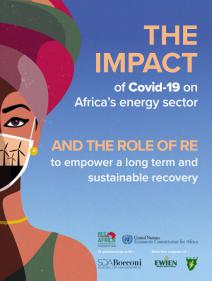The global energy landscape is undergoing a major transformation and renewable energy is playing an increasingly vital role in helping countries develop modern, sustainable, and secure energy systems. Moreover, thanks to their decreasing costs, renewable energies, technological advancements and greater resilience, as demonstrated during the corona virus pandemic, are helping with this transition on a global scale, enabling society to make progress on several of the seventeen Sustainable Development Goals (SDGs). In Africa, clean energy technologies display an even larger potential since they allow transition to sustainable energy mix, and contribute to improvements towards achieving the various SDGs. The COVID-19 pandemic has triggered demand and supply side shocks to African economies. Demand side shocks are impacted through different channels, including trade and external demand contraction, oil and non-oil commodity price and demand shocks, and investment effects with consequences on revenue collection and government expenditure. One of the supply side shocks already realized is in labor supply, drastically reduced as a result of lock-downs, particularly in manufacturing and service sectors. The impacts of demand and supply-side shocks in African economies differ depending, among others, on the structure of their economies, dependence on certain commodities for export, the extent of trade and investment disruptions, prevailing public finance positions, and the stringency and duration of public health measures implemented.
Share this:
Release Date:
28 June, 2020
© United Nations Economic Commission for Africa

